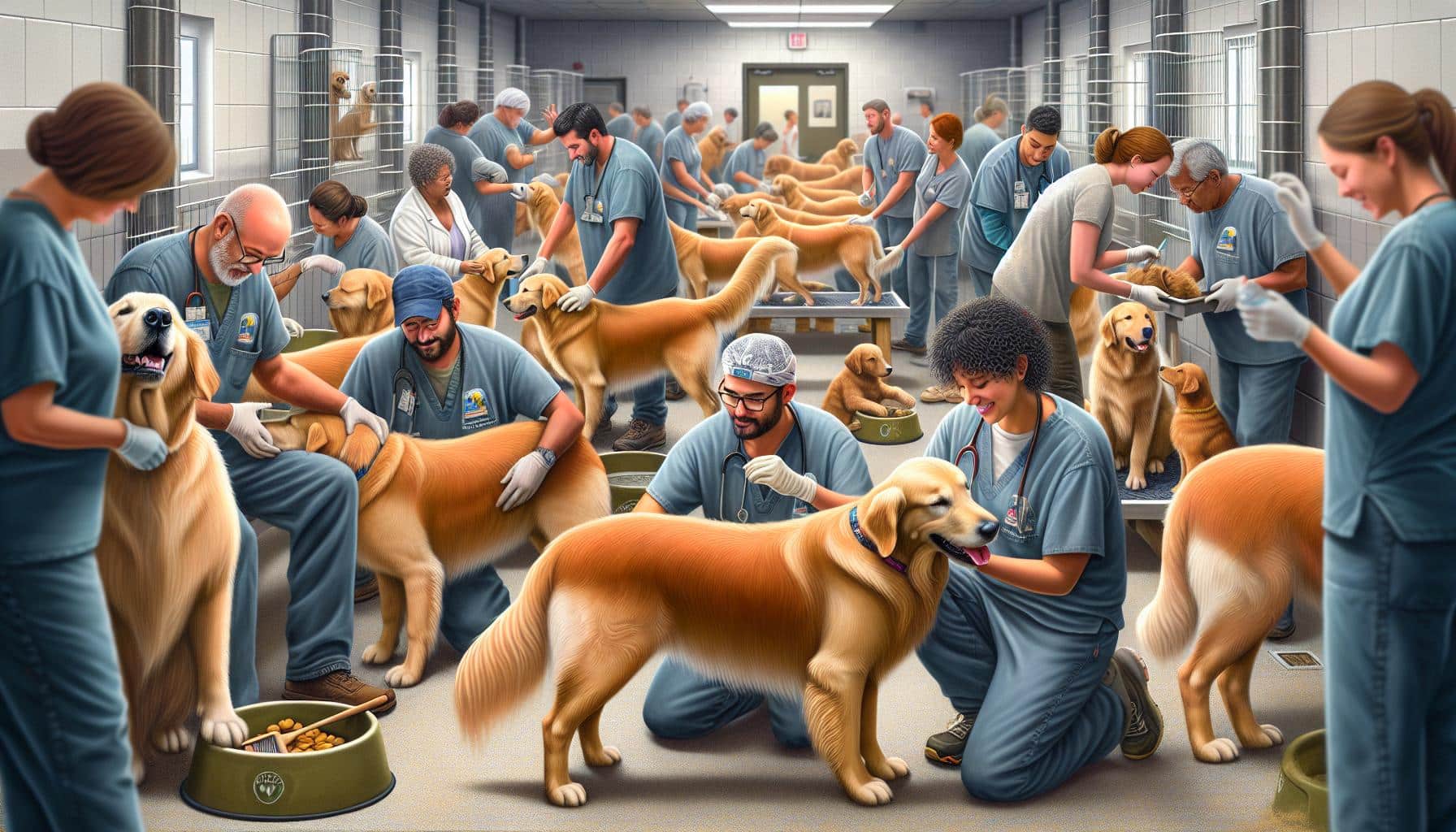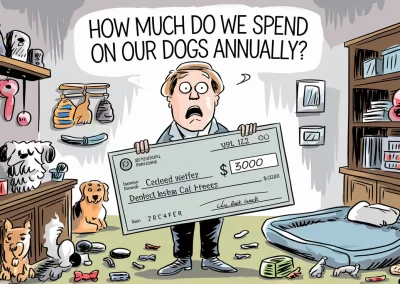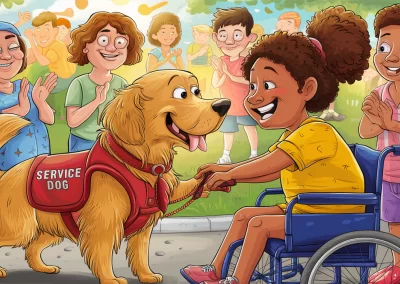27 Golden Retrievers Saved: In a heartwarming turn of events in Rhode Island, a total of 27 golden retrievers, including 20 adorable puppies, were rescued from less-than-ideal living conditions. This rescue operation unfolded in a home in Hopkinton, shedding light on the challenges faced by animals in unlicensed breeding situations.
The collaborative effort between the Hopkinton Police Department, local animal control, the Rhode Island Society for the Prevention of Cruelty to Animals (RISPCA), and an environmental scientist, was triggered by a complaint regarding the welfare of these dogs. Their intervention not only saved these beautiful creatures but also highlighted the importance of responsible pet ownership and breeding practices.
Rescue Operation Unfolds
In the heart of Rhode Island, a heartfelt rescue operation unfolded, bringing hope and light to an otherwise grim situation. I’ve always believed in the power of community, and this event reaffirmed my faith. The operation was triggered by a welfare complaint, a reminder of how crucial vigilance is in safeguarding the wellbeing of animals. Collaboratively, the Hopkinton Police Department, local animal control, the Rhode Island Society for the Prevention of Cruelty to Animals (RISPCA), and an environmental scientist embarked on a mission that would save 27 golden retrievers from dire living conditions.
The scene at the home in Hopkinton was something I’ll never forget. Amidst the chaos, the commitment of the rescue team was a beacon of hope. 27 golden retrievers, including 20 puppies, were found in conditions that no animal should ever endure. It was a stark reminder of the dark side of unlicensed breeding operations. The rescue wasn’t just about saving animals; it was a stand against neglect and a call for humane treatment.
The owner’s lack of a breeder’s license, essential for managing more than 19 puppies, was a pivotal point in the operation. His cooperation with the investigation highlighted the complexities behind pet ownership and breeding. While no immediate charges were filed, the case’s review continues, underscoring the legal and ethical implications of breeding practices.
The home, condemned until further notice, reflected the sad realities some animals face. Yet, amidst the heartbreak, there was a glimmer of hope. The rescue of these 27 golden retrievers opened up a pathway to recovery and a second chance at life. As they begin their journey towards healing and finding forever homes, I’m reminded of the resilience inherent in both humans and animals alike.
Number of Golden Retrievers Rescued
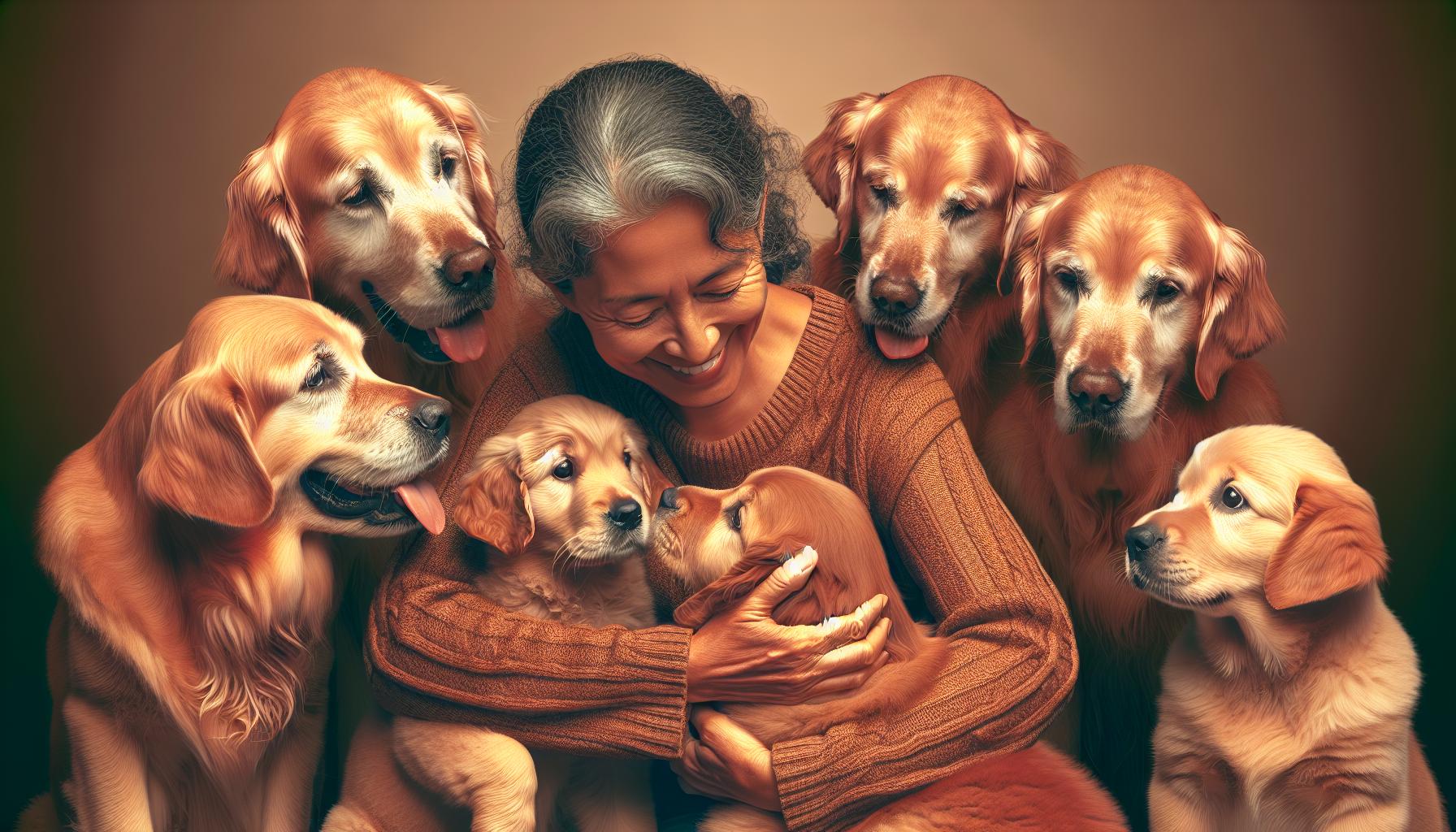
When I heard about the golden retrievers in Rhode Island, my heart immediately went out to them. Let’s dive into the details of this poignant rescue operation. A total of 27 golden retrievers were saved from less-than-ideal living conditions. This included an overwhelming number of 20 puppies, which highlights not just the scale of rescue but the urgency it carried. The love and care these creatures require, especially in their formative weeks, cannot be understated, making this rescue both timely and crucial.
Among these, the division between puppies and adult dogs was stark, drawing attention to the ongoing needs of these animals, not just for rescue, but for future care and attention. The situation underscores a vital fact about pet ownership and breeding: responsibility extends beyond basic needs to include legal and ethical standards, particularly around breeding practices. Breeding without a license, as was the case here with the owner not having a license for at least 19 puppies, violates these standards and can lead to significant neglect and mistreatment.
This operation wasn’t just about numbers; it was a bold statement against irresponsible pet ownership and breeding. Every golden retriever rescued represents a step towards better awareness and adherence to the laws designed to protect them. It’s a reminder that behind every statistic, there’s a story of need, a call for empathy, and an opportunity for a better future. The involvement of various officials and the subsequent condemnation of the property further illuminate the broader implications of this rescue, beyond the immediate relief provided to the animals.
As the retrievers begin their journey to recovery, it’s clear that this rescue is a critical touchpoint in the conversation about responsible pet ownership and breeding. The scale of this operation is not just about the number of dogs saved but about sparking a broader dialogue on ethics, care, and legal compliance in pet management.
Living Conditions in Hopkinton
When I first heard about the 27 Golden Retrievers rescued from a property in Hopkinton, Rhode Island, I was compelled to dig deeper into the living conditions these animals faced. The initial reports revealed a disturbing scene, one where the basic needs of these beautiful creatures were not being met, underscoring a grave situation.
Upon arriving at the scene, authorities discovered the animals living under health-detrimental conditions. The fact that all the dogs tested positive for ringworm, a highly contagious fungal infection, further highlighted the neglect. This unfortunate revelation meant that these Golden Retrievers couldn’t be available for adoption or foster care for several weeks, prolonging their time in recovery and care by the Rhode Island Society for the Prevention of Cruelty to Animals (RISPCA).
Despite the concerning environment, the owner maintained the animals were well-fed, and the areas housing the larger dogs were kept in satisfactory condition. However, a crucial detail emerged about the home’s atmosphere, particularly the overwhelming smell of urine attributed to having 20 dogs indoors. This statement, while attempting to justify the conditions, actually underscores the lack of adequate space and proper care for these animals.
Moreover, the revelation that the owner lacked a breeder’s license for the 20 puppies raises significant legal implications. It’s crucial to understand that such licenses are not just bureaucratic red tape; they are essential for ensuring the ethical and responsible breeding and care of animals. This requirement is especially pertinent considering the owner admitted to being unable to control the number of puppies produced.
The situation in Hopkinton serves as a stark reminder of the responsibilities pet owners and breeders have toward their animals. Ensuring adequate living conditions goes beyond providing food and shelter; it encompasses medical care, space, and a clean environment, elements that were evidently lacking in this case.
Collaborative Effort to Save the Retrievers
In the heart of Rhode Island, a significant rescue operation unfolded, testament to the power of collaboration and community in safeguarding animal welfare. It’s a story that deeply moved me and one I feel compelled to share. The rescue of 27 Golden Retrievers from a home in Hopkinton wasn’t just another day’s work; it was a meticulously coordinated effort involving local law enforcement, the Rhode Island Society for the Prevention of Cruelty to Animals (RISPCA), and concerned citizens.
The Hopkinton Police Department played a pivotal role in the operation. After receiving tips about an unlicensed breeding operation, officers didn’t hesitate to investigate. What they found was disheartening: 27 Golden Retrievers living in conditions far from ideal. But it was the immediate surrender of the dogs by the homeowner that allowed for swift action, showcasing the homeowner’s cooperation despite the circumstances.
The RISPCA’s involvement was nothing short of heroic. Taking custody of 20 puppies and seven adult dogs, their team embarked on the challenging journey of rehabilitation. The dogs, suffering from neglect and ringworm, needed more than just basic care. They required specialized medical treatment, cleaning, and love – an effort only made possible through the collaboration between the RISPCA and veterinary partners. This wasn’t a task for the faint-hearted. It demanded resources, time, and a profound commitment to animal welfare.
Support from the community cannot be understated. While the owners’ actions raised questions, it’s essential to remember the wider context. Kal Farley, who had previously purchased dogs from the owner, pointed out the complexities of managing a large number of pets, especially in adverse weather conditions. While not excusing the situation, comments like Farley’s highlight the nuanced challenges pet owners face and underscore the importance of community support and understanding in addressing animal welfare issues effectively.
Beyond the rescue, the story highlights a critical need for awareness and education regarding pet ownership and breeding practices. It also underscores the vital role of licensing in ensuring the well-being of animals in breeding operations.
Importance of Responsible Pet Ownership
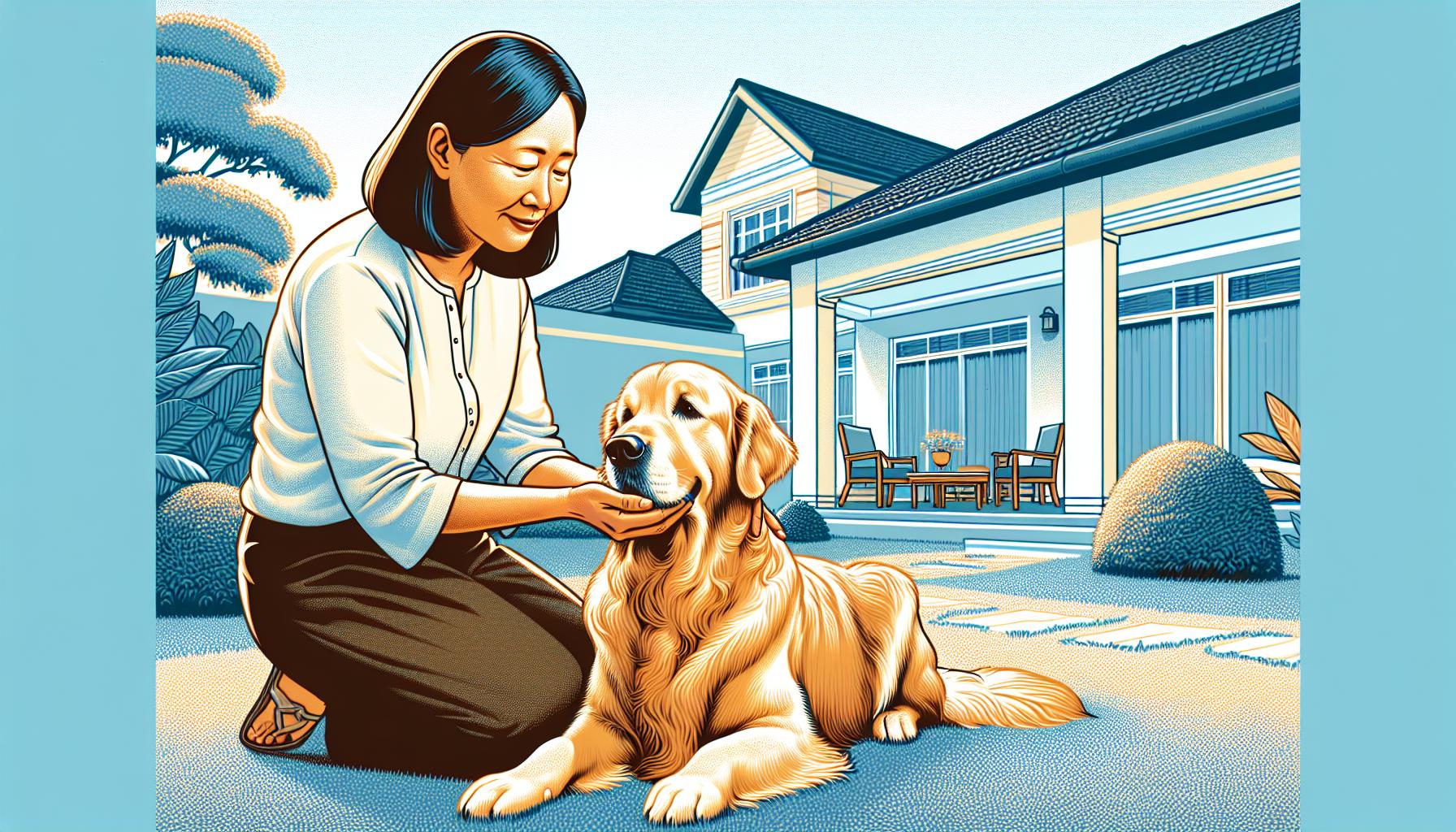
When I first learned about the rescue of 27 Golden Retrievers in Rhode Island, it struck a chord with me on the imperative of responsible pet ownership. Keeping pets, especially large breeds like Golden Retrievers, involves more than just providing food and water. It’s a commitment to ensuring their well-being, happiness, and health.
Responsibility starts with understanding the breed’s needs. Golden Retrievers, for instance, are energetic and require ample space and regular exercise to stay healthy. They’re also social animals that crave human interaction, making it essential for owners to spend quality time with them. It’s not just about having the space; it’s about having the time and resources to dedicate to their care.
Another critical aspect of responsible pet ownership is ensuring your pets are legally compliant. In the case of the Rhode Island rescue, the owner was unaware that a breeder’s license was mandatory for having at least 19 puppies. This oversight illustrates the importance of knowing and adhering to local pet ownership laws and regulations. These laws are in place not just for the welfare of the animals but also for the community’s safety.
Responsible breeding practices are equally important. The situation where the owner could not control the number of puppies his dogs had underscores the necessity of planned and responsible breeding. Uncontrolled breeding can lead to overpopulation, making it challenging to provide adequate care for each animal. It can also contribute to genetic health problems, further emphasizing the need for responsible breeding practices.
Investigating and addressing the complexities of pet ownership, as in the Rhode Island case, reminds me of how vital education, awareness, and community support are in promoting responsible pet ownership. Whether it’s through adopting from reputable organizations, educating oneself on the breed’s specific needs, or supporting local animal welfare initiatives, there are numerous ways we can all contribute to ensuring pets lead happy, healthy lives in a loving home.
Conclusion
The rescue of 27 Golden Retrievers in Rhode Island serves as a pivotal reminder of the critical role education and awareness play in the realm of pet ownership. It’s a call to action for prospective and current pet owners alike to dive deep into the needs of their furry friends, ensuring they’re not just loved but also legally and ethically cared for. I’ve seen firsthand the difference that informed, responsible ownership can make, not just for the pets but for the community at large. This story isn’t just about the dogs rescued; it’s a spotlight on the importance of making well-informed decisions in pet breeding and ownership. Let’s take this as a learning opportunity to spread the word on responsible pet care, championing a future where every pet finds a home equipped to meet their needs.
Frequently Asked Questions
What is responsible pet ownership?
Responsible pet ownership involves understanding and meeting the specific needs of your pet, including proper feeding, socialization, exercise, and health care. It also includes abiding by local pet ownership laws and regulations.
Why is understanding breed-specific needs important?
Understanding breed-specific needs is crucial as different breeds, such as Golden Retrievers, have unique care requirements. Tailoring care to these needs ensures the physical and emotional well-being of the pet.
What legal aspects should pet owners be aware of?
Pet owners should be aware of local laws and regulations related to pet ownership. This includes licensing requirements, leash laws, and guidelines for responsible breeding practices.
How did the Rhode Island rescue highlight legal compliance issues?
The Rhode Island rescue case underscored the importance of legal compliance when a breeder was found unaware of the necessary licensing requirements. This situation highlights the need for education and awareness regarding local pet ownership laws.
What are the consequences of irresponsible breeding?
Irresponsible breeding can lead to pet overpopulation and exacerbate genetic health issues within certain breeds. It impacts the well-being of the animals and can contribute to higher rates of abandonment and euthanasia.
How can education and community support improve responsible pet ownership?
Education and community support can significantly improve responsible pet ownership by raising awareness about the needs of different breeds, legal requirements, and the importance of adopting best practices in pet care. Communities can provide resources and support for pet owners to ensure the well-being of animals.

